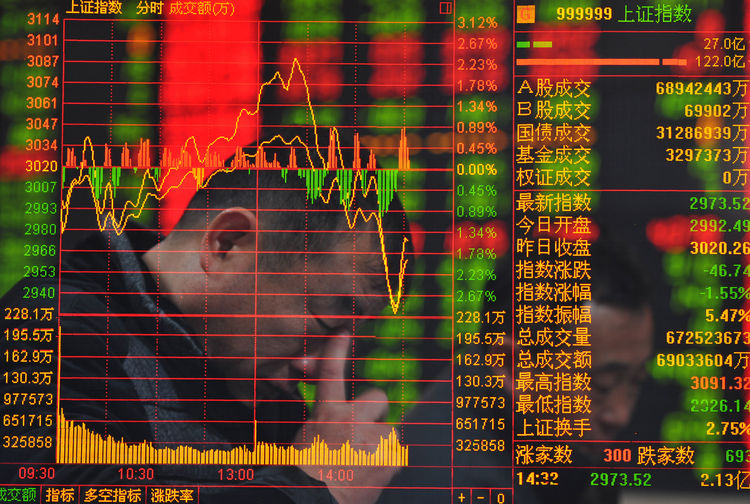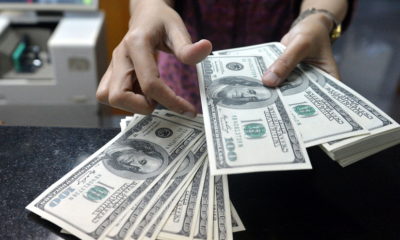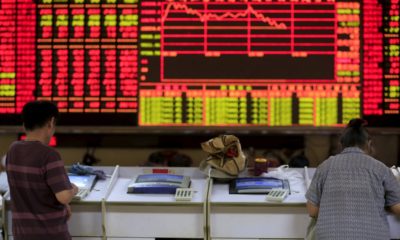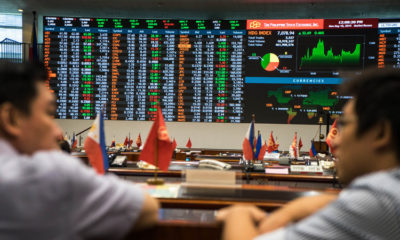The global equity bear market deepened in Asia, with Japanese stocks suffering their worst week since 2008 amid anxiety over central banks’ ability to revive the world economy. European stock-index futures signaled gains as oil rose from a 12-year low.
The Topix index slumped 5.4 percent in Tokyo as traders returned from holiday, pushing the regional Asian benchmark toward its steepest weekly drop since gyrations in Chinese assets at the start of the year. The yen was set for its strongest two-week advance since 1998. U.S. index futures also flagged a rebound after losses there helped the MSCI All-Country Index cap a 20 percent slide from its May record.
“We’re in a moment where Peter Pan thinks he can’t fly any more,” said Ryuta Otsuka, a strategist at Toyo Securities Co. in Tokyo. “When everyone thinks they can’t fly, we’re doomed. There’s nothing we can do but to try and overturn that sentiment.”
Japanese Finance Minister Taro Aso said regulators will respond to market volatility if necessary after a move to negative rates failed to assuage anxieties last month. A stronger yen threatens to imperil the world’s third-largest economy through disinflation and lower profits for exporters. Investors ignored a second day of testimony from Janet Yellen, whose indication that the Federal Reserve won’t rush to raise interest rates failed to stem a selloff in riskier assets.
Stocks
The MSCI’s Asia Pacific Index was down 2.8 percent as of 7:08 a.m. London time, on track for a weekly decline of 5.9 percent. The Topix has lost 12.6 percent this week, the most since October 2008. Nomura Holdings Inc. plunged 9.2 percent to the lowest level since December 2012. While Japan resumed trading after a Thursday break, markets in mainland China, Taiwan and Vietnam remain closed for Lunar New Year holidays.
Hong Kong’s Hang Seng Index lost 1 percent, the Kospi index in Seoul slipped 1.4 percent, while Australia’s S&P/ASX 200 Index sank 1.2 percent.
Futures on the Euro Stoxx 50 index were up 0.7 percent, while those on the Standard & Poor’s 500 Index rallied 0.3 percent. The S&P 500 reduced a slump of as much as 2.3 percent to close down 1.2 percent in afternoon trade.
Trading in South Korea’s Kosdaq exchange for smaller stocks was halted for 20 minutes after the benchmark gauge plunged more than 8 percent on concern valuations were excessive relative to earnings prospects. Celltrion Inc. slid 12 percent, paring its gain this year to 18 percent. The stock was among the 10 biggest gainers in Asia in 2015. Kakao Corp. tumbled 7.9 percent.
Currencies
The yen gained 0.3 percent to 112.14 per dollar. Japan’s currency has strengthened at least 2 percent against all its 31 major peers since Jan. 29 amid demand for haven assets. Government officials expressed concern at the moves, fueling speculation Japan may intervene.
“The verbal intervention has already started, with Ministry of Finance officials talking about moves being rough, which looks like the new code word for undesired strength,” said Ray Attrill, co-head of currency strategy at National Australia Bank Ltd. in Sydney. “110 might be some line in the sand when the MOF will lean on the BOJ to shore things up.”
Higher-yielding and developing nation currencies weakened. The New Zealand dollar fell 0.6 percent to 66.76 U.S. cents, while the Malaysian ringgit dropped 0.5 percent, the Thai baht slid 0.8 percent and the South Korean won lost 0.7 percent.
Bonds
Japan’s 10-year government bond yield rose 7 basis points to 7.5 basis points after falling below zero earlier this week. The similar U.S. Treasury yield rose three basis points to 1.69 percent. The Markit iTraxx Asia index of credit-default swaps rose two basis points to 183, the highest since 2012. That for Japan climbed five basis points to 107.
Commodities
Oil rebounded amid the most volatile prices since 2009 as speculation swirls over whether producers will act to bolster the market. Futures climbed as much as 5.9 percent and were recently up 4.1 percent.
Gold retreated 0.4 percent after a 4.1 percent surge on Thursday. Bullion is set to climb 5.9 percent this week, the most since 2011, as investors flee a bear market in global stocks, a weakening dollar and the fallout from negative interest rates. Nickel rose 0.9 percent after slumping 3.6 percent on Thursday to the lowest close since 2003.
Bloomberg

 Naira4 weeks ago
Naira4 weeks ago
 News3 weeks ago
News3 weeks ago
 Education4 weeks ago
Education4 weeks ago
 Social Media4 weeks ago
Social Media4 weeks ago
 Economy4 weeks ago
Economy4 weeks ago
 Investment4 weeks ago
Investment4 weeks ago
 Dividends4 weeks ago
Dividends4 weeks ago
 Business3 weeks ago
Business3 weeks ago



























